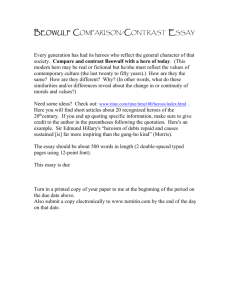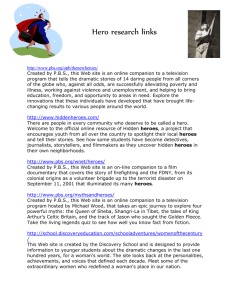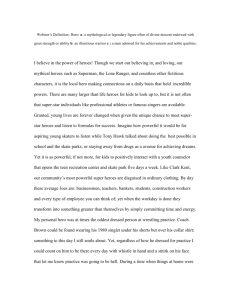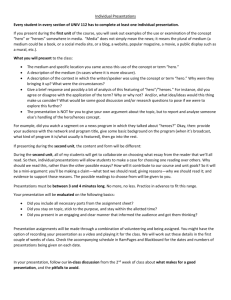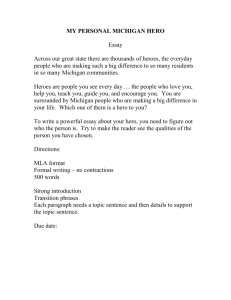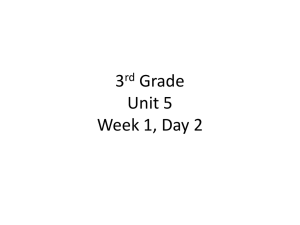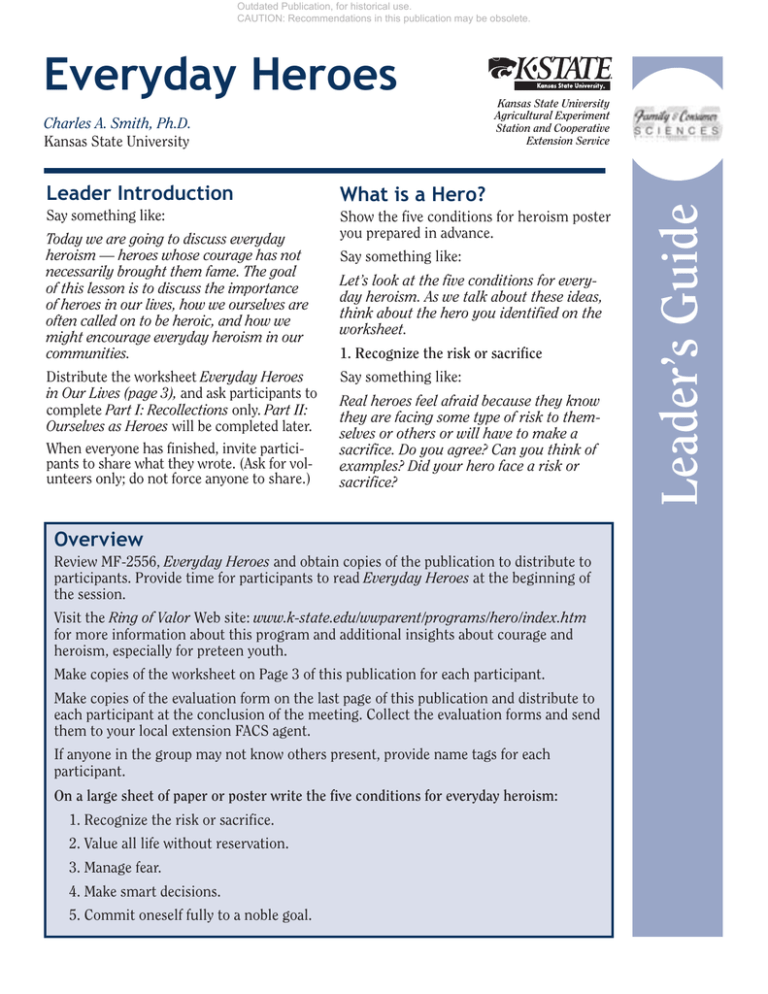
Outdated Publication, for historical use.
CAUTION: Recommendations in this publication may be obsolete.
Charles A. Smith, Ph.D.
Kansas State University
Leader Introduction
Say something like:
Today we are going to discuss everyday
heroism — heroes whose courage has not
necessarily brought them fame. The goal
of this lesson is to discuss the importance
of heroes in our lives, how we ourselves are
often called on to be heroic, and how we
might encourage everyday heroism in our
communities.
Distribute the worksheet Everyday Heroes
in Our Lives (page 3), and ask participants to
complete Part I: Recollections only. Part II:
Ourselves as Heroes will be completed later.
When everyone has finished, invite participants to share what they wrote. (Ask for volunteers only; do not force anyone to share.)
Kansas State University
Agricultural Experiment
Station and Cooperative
Extension Service
What is a Hero?
Show the five conditions for heroism poster
you prepared in advance.
Say something like:
Let’s look at the five conditions for everyday heroism. As we talk about these ideas,
think about the hero you identified on the
worksheet.
1. Recognize the risk or sacrifice
Say something like:
Real heroes feel afraid because they know
they are facing some type of risk to themselves or others or will have to make a
sacrifice. Do you agree? Can you think of
examples? Did your hero face a risk or
sacrifice?
Overview
Review MF-2556, Everyday Heroes and obtain copies of the publication to distribute to
participants. Provide time for participants to read Everyday Heroes at the beginning of
the session.
Visit the Ring of Valor Web site: www.k-state.edu/wwparent/programs/hero/index.htm
for more information about this program and additional insights about courage and
heroism, especially for preteen youth.
Make copies of the worksheet on Page 3 of this publication for each participant.
Make copies of the evaluation form on the last page of this publication and distribute to
each participant at the conclusion of the meeting. Collect the evaluation forms and send
them to your local extension FACS agent.
If anyone in the group may not know others present, provide name tags for each
participant.
On a large sheet of paper or poster write the five conditions for everyday heroism:
1. Recognize the risk or sacrifice.
2. Value all life without reservation.
3. Manage fear.
4. Make smart decisions.
5. Commit oneself fully to a noble goal.
Leader’s Guide
Everyday Heroes
Outdated Publication, for historical use.
CAUTION: Recommendations in this publication may be obsolete.
2. Value all life without reservation
Ourselves as Heroes
Say something like:
Say something like:
Everyday heroes have a conscience
and care about themselves and others.
Research on rescuers who risked their
lives for Jews during WWII showed that
they had a reverence for all life, not just
for those within a certain group. Did your
hero show caring in any way? (Discuss.)
Let’s take a moment to think about ourselves as everyday heroes. Complete
“Part II: Ourselves as Heroes” on the worksheet. Because your response to this issue
could be personal, we will discuss your
responses only if you volunteer to do so.
3. Manage fear
Say something like:
Everyday heroes know they may face a
threat. They do not panic mindlessly or
react foolishly. They quiet their turbulent
emotions so they can respond as effectively as possible. They stay in control.
Sometimes retreat is the best choice.
Sometimes adversity must be faced courageously. What do you think? Did the hero
you selected feel afraid? If so, was the fear
held in check?
The person lacking courage is controlled
by fear. The hero manages fear to act courageously. Fear is an emotion for self-protection.
4. Make smart decisions
Say something like:
Everyday heroes may be very afraid, but
they still use their minds to respond to
the threat as effectively as possible. This
thinking can be extremely fast and accomplished in just a few seconds. Why is staying alert important? What awareness did
your hero demonstrate? (Discuss.)
5. Commit oneself fully to a noble goal
Say something like:
Everyday heroes are willing to take risks
and make sacrifices because of deeply held,
priority values. They do not just talk about
what is important. They act honorably to
achieve a noble goal. What is important
enough for you that you would be willing
to make a sacrifice or take a risk? Did your
hero example have a noble goal? (Discuss.)
If someone wants to share his or her
thoughts, provide time for discussion to
occur. Do not pressure anyone to reveal
what he or she wrote.
Heroism in Our Community
Say something like:
Let’s take a few minutes to discuss how we
might encourage everyday heroism in our
communities. (Discuss.)
Brainstorm ways parents and teachers might nurture courage in children.
Encourage participants to visit the Ring of
Valor Web site at:
http://www.k-state.edu/wwparent/
programs/hero/index.htm for more information about introducing the concept of
heroism to students in Grades 4 through 6.
You could write the address for all to see,
or direct them to the last page of the fact
sheet.
Final Comments
Summarize the discussion in your group.
Distribute the Everyday Heroes Program
Evaluation form. Thank participants for
attending the session and collect the forms.
Outdated Publication, for historical use.
CAUTION: Recommendations in this publication may be obsolete.
Worksheet: Everyday Heroes in Our Lives
Part I: Recollections (To be shared with the group.)
Think back to your childhood and youth. Can you recall anyone who seemed heroic to you?
In the space below, identify the qualities that made that person heroic in your eyes. If you
cannot remember anyone who fit your idea of heroism, describe your ideal hero while you
were growing up. What character traits are associated with heroism?
Part II: Ourselves as Heroes (Your thoughts are your own, unless you wish to share.)
One universal quality of true heroes is that they do not view themselves as heroes. They
typically become uncomfortable with any public attention for their deeds. Measure your
own heroism by the greatness of the fears you have overcome. Think back to your past.
What fears have you faced? How did you respond? Have you ever taken a risk to help someone else or demonstrate personal integrity? Keep in mind that the greatest acts of heroism
may never gain public recognition.
Outdated Publication, for historical use.
CAUTION: Recommendations in this publication may be obsolete.
Everyday Heroes Program Evaluation
County ________________________ Date ________________________________
1. How do I rate this program in general? ❏ Excellent ❏ Good
❏ Fair
❏ Poor
2. Did the publication Everyday Heroes increase your knowledge about courage and
heroism?
❏ Yes
❏ No
3. If your response to question #2 was “yes,” can you describe what you learned?
4. As a result of participating in this program, do you think you will do anything different in the future?
❏ Yes
❏ No
5. If your response to question #4 was “yes,” can you describe what you will do differently?
6. Additional comments or suggestions:
Brand names appearing in this publication are for product identification purposes only.
No endorsement is intended, nor is criticism implied of similar products not mentioned.
Publications from Kansas State University are available on the World Wide Web at: http://www.oznet.ksu.edu
Publications from Kansas State University may be freely reproduced for educational purposes. All other rights reserved.
In either case, credit Charles A. Smith, Ph.D., Everyday Heroes, July 2008.
Kansas State University Agricultural Experiment Station and Cooperative Extension Service , Manhattan, Kansas
MF2555 rev.
July 2008
K-State Research and Extension is an equal opportunity provider and employer. Issued in furtherance of Cooperative Extension Work,
Acts of May 8 and June 30, 1914, as amended. Kansas State University, County Extension Councils, Extension Districts, and United States
Department of Agriculture Cooperating, Fred A. Cholick, Director.


